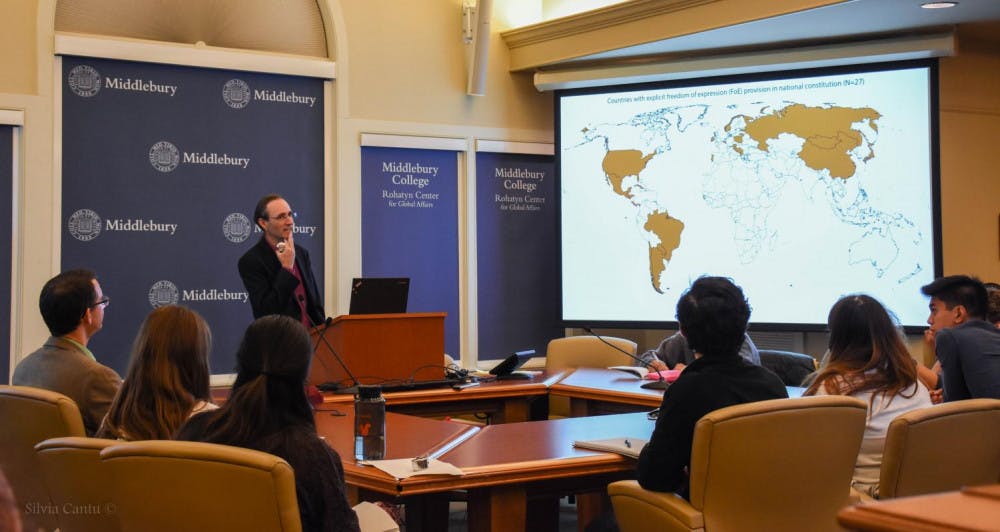Students and faculty gathered at the Robert A. Jones ‘59 Conference Room on Thursday Nov. 9 to attend the lecture, “Free Expression and the Global Expansion of Judicial Power”. The lecture was delivered by professor Thomas Keck, who teaches political science at Syracuse University, and sponsored by the political science department, the Pre-Law Society, the Rohatyn Center, and Atwater Commons. Keck is currently collaborating with Middlebury College political science professor Erik Bleich in building a public database containing the results of judicial cases around the world that concern free expression.
Keck started his lecture by highlighting how 184 countries around the world have explicit laws granting freedom of expression in their constitutions. He explained that the extent to which such laws are enforced, and the manner in which such laws are defined, varies greatly among these countries.
Keck then described how judicial powers have arisen in many ex-axis, ex-communist, and ex-colonial nations, and that an increasing number of countries have established more independent judicial institutions. According to Keck, judicial review is designed to protect individual liberty and the rights of minority groups. He also introduced conflicting perspectives on the reality of judicial power.. For example, Ran Hirschl, a political science professor at the University of Toronto, argues that judicial review protects existing power relations. Some scholars, on the other hand, believe that such courts protect oppressed groups.
Keck presented individual cases which specified the rights protected by freedom of expression laws. He cited Terminiello vs. Chicago (US 1949), where a Catholic priest, Arthur Terminiello, gave an inflammatory speech criticizing various racial groups. In another case, the Supreme Court eventually decided that the ordinance rule was a violation of the First Amendment. Then in Fiener v. New York (US 1951), a college student named Irving Fiener was arrested for making an inflammatory speech, urging a crowd of blacks and whites to “rise up in arms and fight for [their] rights.” In this case, the Supreme Court decided that Fiener’s First Amendment rights were not violated, since the cause of his arrest was inciting a riot, and not the content of his speech.
Keck then offered three ways of looking at the data gathered by him and Bleich. Such methods allow one to observe “how constitutional courts respond to similar Freedom of Expression claims from differently situated claimants,” Keck said. The first method involves performing a single-country (or single-court) analysis. The second involves performing cross-national (or cross-court) comparisons. These methods are especially helpful in determining if a global standard of handling free expression cases is emerging, as well as in identifying which nations are outliers from the set standard. In addition, one might utilize the second method to decide if U.S and Canadian courts have unique patterns in handling free expression cases. The third method, finally, involves comparisons across types of expression.
Bleich was asked to describe the process of inviting Keck to speak on Thursday.
“Professor Keck was invited to talk about how courts deal with freedom of expression around the world,” said Bleich. “He is the lead researcher on a multi-year National Science Foundation project that I am involved in that includes several Middlebury students. The idea is to examine every freedom of speech ruling in every high court around the world, including US state Supreme Courts, the US Supreme Court, other countries’ equivalent high courts, and international jurisdictions like the European Court of Human Rights.”
Bleich further elaborated on the status of the project.
‘This project is ongoing, and we are working with partners around the world collecting information on how courts deal with freedom of speech issues,’ said Bleich. ‘The premise behind this study is that courts have become more important over time in deciding speech issues. This is partly because more countries have developed constitutional provisions that protect freedom of expression, and partly because courts are simply becoming more influential in almost every country in making major decisions that affect our daily lives.’
‘[Keck’s] overview was an introduction to this topic, because we haven’t collected information on every court around the world yet, but we do have good information on a few courts,’ said Bleich. ‘So he was able to review some basic similarities and differences in how these courts have dealt with free speech issues. These decisions involved a wide variety of topics, such as hate speech, commercial speech (advertisements), pornography, obscenity, religious values, or anti-judge-defamation cases.’
Guest Delivers Free Expression Lecture

Comments


